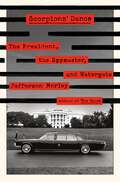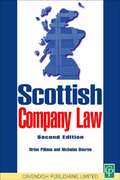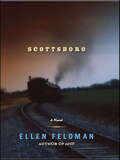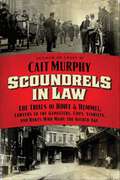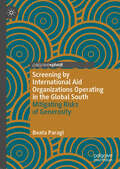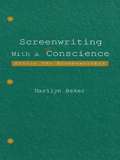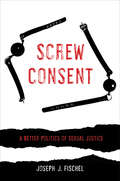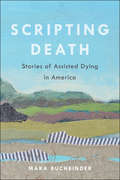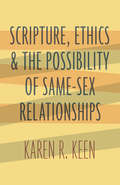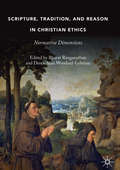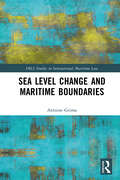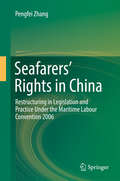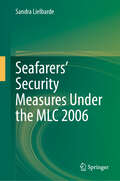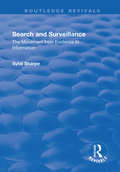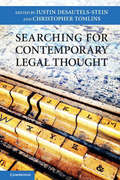- Table View
- List View
Scopri il tuo potere: l'universo dentro di te
by Gautam SharmaLa consapevolezza dell'ego e la connessione al campo unificato. ...essere amati per se stessi ed essere apparentemente separati dal proprio stato originale di consapevolezza e dal campo unificato, ha proporzioni spirituali talmente profonde che, sin dalla prima infanzia si innescano dei processi in aree strategiche del cervello tali da provocare uno squilibrio e la dominanza, oltre alla negazione, alla sfiducia, al trascurare la nostra connessione al campo unificato e l'amore e la gioia e uno stato di consapevolezza spirituale ancora più profondo dentro di noi
Scorched Earth: Environmental Warfare as a Crime against Humanity and Nature (Human Rights and Crimes against Humanity #38)
by Emmanuel KreikeA global history of environmental warfare and the case for why it should be a crimeThe environmental infrastructure that sustains human societies has been a target and instrument of war for centuries, resulting in famine and disease, displaced populations, and the devastation of people’s livelihoods and ways of life. Scorched Earth traces the history of scorched earth, military inundations, and armies living off the land from the sixteenth to the twentieth century, arguing that the resulting deliberate destruction of the environment—"environcide"—constitutes total war and is a crime against humanity and nature.In this sweeping global history, Emmanuel Kreike shows how religious war in Europe transformed Holland into a desolate swamp where hunger and the black death ruled. He describes how Spanish conquistadores exploited the irrigation works and expansive agricultural terraces of the Aztecs and Incas, triggering a humanitarian crisis of catastrophic proportions. Kreike demonstrates how environmental warfare has continued unabated into the modern era. His panoramic narrative takes readers from the Thirty Years' War to the wars of France's Sun King, and from the Dutch colonial wars in North America and Indonesia to the early twentieth century colonial conquest of southwestern Africa.Shedding light on the premodern origins and the lasting consequences of total war, Scorched Earth explains why ecocide and genocide are not separate phenomena, and why international law must recognize environmental warfare as a violation of human rights.
Scorpions' Dance: The President, the Spymaster, and Watergate
by Jefferson MorleyFor the 50th anniversary of the Watergate break-in: The untold story of President Richard Nixon, CIA Director Richard Helms, and their volatile shared secrets that ended a presidency.Scorpions' Dance by intelligence expert and investigative journalist Jefferson Morley reveals the Watergate scandal in a completely new light: as the culmination of a concealed, deadly power struggle between President Richard Nixon and CIA Director Richard Helms.Nixon and Helms went back decades; both were 1950s Cold Warriors, and both knew secrets about the disastrous Bay of Pigs invasion of Cuba as well as off-the-books American government and CIA plots to remove Fidel Castro and other leaders in Latin America. Both had enough information on each other to ruin their careers.After the Watergate burglary on June 17, 1972, Nixon was desperate to shut down the FBI's investigation. He sought Helms' support and asked that the CIA intervene—knowing that most of the Watergate burglars were retired CIA agents, contractors, or long-term assets with deep knowledge of the Agency's most sensitive secrets. The two now circled each other like scorpions, defending themselves with the threat of lethal attack. The loser would resign his office in disgrace; the winner, however, would face consequences for the secrets he had kept.Rigorously researched and dramatically told, Scorpions' Dance uses long-neglected evidence to reveal a new perspective on one of America's most notorious presidential scandals.
Scotland Yard's Flying Squad: 100 Years of Crime Fighting
by Dick KirbyA history of the famed London police unit, by a former member and author who &“knows how to bring his coppers to life on each page&” (Joseph Wambaugh, New York Times–bestselling author of The Onion Field). Since 1919, Scotland Yard&’s Flying Squad has been in the forefront of the war against crime. From patrolling London&’s streets in horse-drawn wagons, it has progressed to the use of the most sophisticated surveillance and crime-fighting equipment. The Squad targeted protection gangs who infested British racecourses and greyhound tracks, and later the highly effective Ghost Squad was formed to tackle black-marketeering in the aftermath of the Second World War. As crime soared in the 1950s and &’60s the Flying Squad, or C8 Department as it was now known, became involved in the most serious cases nationwide—The Great Train Robbery, the Brink&’s-Mat robbery, The Millennium Dome and Hatton Garden heists. Today the ruthless drug and people trafficking gangs that seek rich pickings in London and elsewhere are in their sights. Despite many high-profile successes, allegations of corruption have haunted the Flying Squad, and after the conviction of officers in 2001 there was a very real possibility of disbandment. Yet this most famous of police units survived—and today continues to fight and be feared by the hardest of criminals. This book draws on firsthand accounts to tell the Flying Squad&’s thrilling story, and includes a foreword by John O&’Connor, a former commander. &“A book that true crime aficionados will want to read.&” —Washington Times
Scotland Yard's Flying Squad: 100 Years of Crime Fighting
by Dick KirbyA history of the famed London police unit, by a former member and author who &“knows how to bring his coppers to life on each page&” (Joseph Wambaugh, New York Times–bestselling author of The Onion Field). Since 1919, Scotland Yard&’s Flying Squad has been in the forefront of the war against crime. From patrolling London&’s streets in horse-drawn wagons, it has progressed to the use of the most sophisticated surveillance and crime-fighting equipment. The Squad targeted protection gangs who infested British racecourses and greyhound tracks, and later the highly effective Ghost Squad was formed to tackle black-marketeering in the aftermath of the Second World War. As crime soared in the 1950s and &’60s the Flying Squad, or C8 Department as it was now known, became involved in the most serious cases nationwide—The Great Train Robbery, the Brink&’s-Mat robbery, The Millennium Dome and Hatton Garden heists. Today the ruthless drug and people trafficking gangs that seek rich pickings in London and elsewhere are in their sights. Despite many high-profile successes, allegations of corruption have haunted the Flying Squad, and after the conviction of officers in 2001 there was a very real possibility of disbandment. Yet this most famous of police units survived—and today continues to fight and be feared by the hardest of criminals. This book draws on firsthand accounts to tell the Flying Squad&’s thrilling story, and includes a foreword by John O&’Connor, a former commander. &“A book that true crime aficionados will want to read.&” —Washington Times
Scotland Yard's Murder Squad
by Dick KirbyGet a behind-the-scenes look at fourteen historic cases from the Murder Squad of Scotland Yard in this collection perfect for true crime fans.In 1906 the Metropolitan Police Commissioner was asked by the Home Office to make available skilled investigators for murder inquiries nationwide as few constabularies had sufficiently skilled—or indeed, any—detectives.Thus was born the Reserve Squad, or Murder Squad, as it later became known. Despite a reluctance by some forces to call upon The Met, the Murder Squad has proved its effectiveness on countless occasions with its remit extended to British territories overseas. A particularly sensitive case was the murder of a local superintendent on St. Kitts and Nevis.A former Scotland Yard detective, the author uses his contacts and experiences to get the inside track on a gruesome collection of infamous cases. Child murderers, a Peer’s butler, a King’s housekeeper, gangsters, jealous spouses and the notorious mass murderer Dr. Bodkin Adams compete for space in this spine-chilling and gripping book which is testament to the Murder Squad’s skills and ingenuity—and the evil of the perpetrators.Brimming with gruesome killings, this highly readable book proves that there is no substitute for old fashioned footwork and instinct.
Scottish Company Law
by Brian Pillans Nicholas BourneThe second edition of this successful book incorporates many important developments, such as the changing judicial approach to directors' duties and disqualification orders, recent developments in auditors' liability and the effect of the House of Lords decision in Sharp v Thompson. New legislation includes the Competition Act 1998 and the Human Rights Act 1998. Recent work of the Law Commissions on Shareholder Remedies and Directors Duties is examined. The ongoing debate on corporate governance is brought up to date with the incorporation of the Greenbury and Hampel Reports and the Combined Code on Corporate Governance and the work of the DTI on reform of company law is explained.
Scottish Criminals
by Gary SmailesLively true stories for young readers about infamous outlaws of Scottish history. Gary Smailes explores the darker side of Scottish history in this entertaining and informative book, written for middle grade readers. Featuring twenty-five true stories from the sixteenth century to the present day, Scottish Criminals introduces a motley crew of Scots (as well as a couple of heroes who might not have been so heroic after all), who have made their infamous mark in history—from pirates and murderers to thieves, outlaws, and even cannibals. In addition, these shady characters are vividly brought to life by award-winning children&’s illustrator Scoular Anderson.
Scottsboro: A Novel
by Ellen FeldmanA powerful novel about race, class, sex, and a lie that refused to die. Alabama, 1931. A posse stops a freight train and arrests nine black youths. Their crime: fighting with white boys. Then two white girls emerge from another freight car, and fast as anyone can say Jim Crow, the cry of rape goes up. One of the girls sticks to her story. The other changes her tune, again and again. A young journalist, whose only connection to the incident is her overheated social conscience, fights to save the nine youths from the electric chair, redeem the girl who repents her lie, and make amends for her own past. Intertwining historical actors and fictional characters, stirring racism, sexism, and anti-Semitism into an explosive brew, Scottsboro is a novel of a shocking injustice that convulsed the nation and reverberated around the world, destroyed lives, forged careers, and brought out the worst and the best in the men and women who fought for the cause.
Scoundrels in Law: The Trials of Howe & Hummel, Lawyers to the Gangsters, Cops, Starlets, and Rakes Who Made the Gilded Age
by Cait N. MurphyFrom the critically acclaimed author of Crazy '08 comes the thrilling true story of the most colorful and notorious law firm in American history. Scoundrels in Law offers an inside look at crime and punishment in the nineteenth century, and a whirlwind tour of the Gilded Age.Gangsters and con men. Spurned mistresses and wandering husbands. Strippers and Broadway royalty. Cat killers and spiritualists. These were the friends and clients of Howe & Hummel, the most famous (and famously rotten) law firm in nineteenth-century America.The partners gloried in their reputation and made a rich living from it. William Howe left London a step ahead of the law to find his destiny defending the perpetrators of murder and mayhem in post-Civil War New York, in an age of really good murders. A dramatic, diamond-encrusted presence, Howe was one of the great courtroom orators of his era, winning improbable acquittals time after time.Abraham Hummel enjoyed a quieter but perhaps more fearsome notoriety, shaking down high society so well and so often that receiving an envelope with the law firm's name on it became almost a rite of passage.The partners bestrode Gilded Age New York with wit and brio, and everyone from Theodore Roosevelt to Lola Montez had a part in their story. In Howe & Hummel's prime, it would not have been unusual to see a leading politician, a pickpocket, a Broadway star, a bank robber, and a socialite all crowded together into the waiting room of their offices, located conveniently across the street from the city jail. Howe and Hummel were not particularly good men. They were perfectly ready—even eager—to lie, cheat, and bribe on behalf of their clients. They did stop short of murder, though, a principle that played a critical role when the famous firm imploded in a truly spectacular web of deceit gone wrong.Through the windows of the dingy premises of Howe & Hummel, readers can glimpse the Gilded Age in all its grime and grandeur. Cait Murphy restores this once-famous duo to their rightful place in the pantheon of great American characters.
Scout Camp: Sex, Death, and Secret Societies Inside the Boy Scouts of America
by James RennerIn this timely and deeply personal true crime memoir, acclaimed journalist, author, creator of the True Crime This Week podcast, and former Boy Scout James Renner, explores the dark side of an American institution, its pervasive culture of sexual abuse, and the traumatic—even deadly—repercussions of its long-buried secrets. In the summer of 1995, at the largest Boy Scout camp in Ohio, a night of sexual violence ended with one counselor dead and another hospitalized. The death was ruled &“accidental.&” It wouldn&’t be the last death associated with Seven Ranges Reservation. James Renner, too, was a counselor at Seven Ranges that year. He was always sure there must be more to the story of Mike Klingler&’s death, because Renner also knew firsthand that the 900-acre camp was not the safe getaway it was portrayed to be. On Friday nights the boys were ushered into the woods for a frightening ceremony in which they learned the rules for becoming good young men—and, above all, that keeping secrets was a Scout&’s duty. No matter how dark the secrets were. Determined to face his demons, Renner embarks on a journey back to that tumultuous summer and exposes a clandestine society that left indelible scars on the Scouts and the staff who were there. For Renner, it meant opening up about his twisted upbringing, his issues with trust and sexuality, and a lifetime of self-medication. The result is a deeply personal, no-holds-barred, and vitally important true crime memoir.
Screening Foreign Direct Investment in the EU: Political Rationale, Legal Limitations, Legislative Options (European Yearbook of International Economic Law #26)
by Jens VeltenForeign Direct Investment (FDI) from third countries—a desirable form of investment to boost the EU’s economy or a threat to important EU and Member State interests that must be mitigated via FDI screening mechanisms? FDI screening is a complex, controversial and highly topical subject at the intersection of law, politics and economics. This book analyzes the political rationale behind FDI screening in the EU, reveals the legal limitations of current FDI screening mechanisms based on security and public order, and identifies legislative options for broader screening mechanisms in accordance with EU and international economic law. In particular, the book identifies the four main concerns in the EU regarding FDI from third countries: distortive competition effects; the lack of reciprocity on FDI treatment between the EU and the investor’s home country; objectives of the investor or their home country that may be detrimental to EU interests; and safety of private information. On this basis, the book analyzes the Screening Regulation (Regulation (EU) 2019/452) and its newly introduced screening ground “security or public order” and asks whether this and other similar screening grounds based on the notions of security, public order and public policy can address these concerns with regard to foreign investors. Based on an analysis of WTO law and EU primary law, it argues that they cannot. Thus, the question arises: Do the EU and Member States have the flexibility to adopt broader FDI screening mechanisms? To answer this question, the book examines the freedoms of capital movement and establishment in EU primary law, as well as various sources of international economic law such as, first and foremost, the WTO’s General Agreement on Trade in Services, but also other bi- and plurilateral trade and investment treaties, including the EU-China Comprehensive Agreement on Investment. In closing, the book identifies various legislative options for broader FDI screening mechanisms—and their shortcomings.
Screening by International Aid Organizations Operating in the Global South: Mitigating Risks of Generosity
by Beata ParagiAid organizations usually embrace the idea of digitalization, both in terms of using diverse technologies and processing data digitally for improving their services, making their operations more efficient and even mitigating various risks. While digital fundraising, the use of biometric ID systems or digitalized cash and voucher assistance enjoys widespread attention both in academic and practitioner circles, it is less known how aid organizations navigate between counterterrorism legislations and data protection laws in technical terms. Limiting the discussion to the EU General Data Protection Regulation and by conceptualizing screening — commonly used to prevent the use of donor money for illicit purposes, money-laundering, terrorism finance or corruption — as a data processing operation conducted by larger international aid organizations operating in the Global South, this book focuses on the matter of ‘transparency’ and ‘right to information’ being at the nexus ofsurveillance studies and privacy studies. By means of legal and social science methods, it simultaneously explores screening in light of classic surveillance and analyses whether opacity around screening by NGOs (data controllers) is in line with the spirit of European Union data protection regime from the perspective of individuals (data subjects). In so doing, Paragi also contributes to the discussion on the politics of transparency and highlights the dilemmas and challenges aid organizations operating in authoritarian regimes or conflict settings may face.
Screenwriting With a Conscience: Ethics for Screenwriters
by Marilyn BekerScreenwriting With a Conscience: Ethics for Screenwriters is for screenwriters who care deeply about what they write; who are aware that movie images matter and can influence audiences; and who want to create meaningful screenplays that make powerful statements while entertaining and winning over audiences. A user-friendly guide to ethical screenwriting, this book makes the case that social responsibility is endemic to public art while it emphatically champions First Amendment rights and condemns censorship.In this dynamic and practical volume, author Marilyn Beker provides methods for self-assessment of values, ideas, and ethical stances, and demonstrates the application of these values to the development of plot, character, and dialogue. Screenwriters are introduced to ethical decision making models and shown--through specific film examples--how they can be utilized in plot and character development. In addition, specific techniques and exercises are supplied to help screenwriters determine the difference between "good" and "evil," to write realistic and compelling characters based on this determination, and to present "messages" and write dialogue powerfully without preaching. This book also puts forth a livable work philosophy for dealing with the ethics of the screenwriting business, and presents a viable personal philosophy for surviving in the screenwriting world.Screenwriting With a Conscience: Ethics for Screenwriters is an indispensible, dynamic guide for the ethics-conscious screenwriter. It is intended for screenwriters at the student and professional level, and is appropriate for beginning to graduate screenwriting courses in film and English programs, and for film courses dealing with Ethics in the Media.
Screw Consent: A Better Politics of Sexual Justice
by Joseph J. FischelWhen we talk about sex—whether great, good, bad, or unlawful—we often turn to consent as both our erotic and moral savior. We ask questions like, What counts as sexual consent? How do we teach consent to impressionable youth, potential predators, and victims? How can we make consent sexy? What if these are all the wrong questions? What if our preoccupation with consent is hindering a safer and better sexual culture? By foregrounding sex on the social margins (bestial, necrophilic, cannibalistic, and other atypical practices), Screw Consent shows how a sexual politics focused on consent can often obscure, rather than clarify, what is wrong about wrongful sex. Joseph J. Fischel argues that the consent paradigm, while necessary for effective sexual assault law, diminishes and perverts our ideas about desire, pleasure, and injury. In addition to the criticisms against consent leveled by feminist theorists of earlier generations, Fischel elevates three more: consent is insufficient, inapposite, and riddled with scope contradictions for regulating and imagining sex. Fischel proposes instead that sexual justice turns more productively on concepts of sexual autonomy and access. Clever, witty, and adeptly researched, Screw Consent promises to change how we understand consent, sexuality, and law in the United States today.
Scripting Death: Stories of Assisted Dying in America (California Series in Public Anthropology #50)
by Mara BuchbinderHow the legalization of assisted dying is changing our lives. Over the past five years, medical aid-in-dying (also known as assisted suicide) has expanded rapidly in the United States and is now legally available to one in five Americans. This growing social and political movement heralds the possibility of a new era of choice in dying. Yet very little is publicly known about how medical aid-in-dying laws affect ordinary citizens once they are put into practice. Sociological studies of new health policies have repeatedly demonstrated that the realities often fall short of advocacy visions, raising questions about how much choice and control aid-in-dying actually affords. Scripting Death chronicles two years of ethnographic research documenting the implementation of Vermont’s 2013 Patient Choice and Control at End of Life Act. Author Mara Buchbinder weaves together stories collected from patients, caregivers, health care providers, activists, and legislators to illustrate how they navigate aid-in-dying as a new medical frontier in the aftermath of legalization. Scripting Death explains how medical aid-in-dying works, what motivates people to pursue it, and ultimately, why upholding the "right to die" is very different from ensuring access to this life-ending procedure. This unprecedented, in-depth account uses the case of assisted death as an entry point into ongoing cultural conversations about the changing landscape of death and dying in the United States.
Scripture, Ethics, and the Possibility of Same-Sex Relationships
by Karen R. KeenWHEN IT COMES TO SAME-SEX RELATIONSHIPS, this book by Karen Keen contains the most thoughtful, balanced, biblically grounded discussion you’re likely to encounter anywhere. With pastoral sensitivity and respect for biblical authority, Keen breaks through current stalemates in the debate surrounding faith and sexual identity.The fresh, evenhanded reevaluation of Scripture, Christian tradition, theology, and science in Keen’s Scripture, Ethics, and the Possibility of Same-Sex Relationships will appeal to both traditionalist and progressive church leaders and parishioners, students of ethics and biblical studies, and gay and lesbian people who often feel painfully torn between faith and sexuality.
Scripture, Ethics, and the Possibility of Same-Sex Relationships
by Karen R. KeenWHEN IT COMES TO SAME-SEX RELATIONSHIPS, this book by Karen Keen contains the most thoughtful, balanced, biblically grounded discussion you&’re likely to encounter anywhere. With pastoral sensitivity and respect for biblical authority, Keen breaks through current stalemates in the debate surrounding faith and sexual identity.The fresh, evenhanded reevaluation of Scripture, Christian tradition, theology, and science in Keen&’s Scripture, Ethics, and the Possibility of Same-Sex Relationships will appeal to both traditionalist and progressive church leaders and parishioners, students of ethics and biblical studies, and gay and lesbian people who often feel painfully torn between faith and sexuality.
Scripture, Tradition, and Reason in Christian Ethics: Normative Dimensions
by Bharat Ranganathan Derek Alan Woodard-LehmanHow should we understand the relationship between Christian ethics and religious ethics? Among comparative, ethnographic, and normative methodologies? Between confessional and non-confessional orientations, or between theology and philosophy? This volume brings together emerging religious ethicists to engage the normative dimensions of Christian ethics. Focusing on scripture, tradition, and reason, the contributors to this volume argue for a vision of Christian ethics as religious ethics. Toward this end, they engage with scripture, interpretation, and religious practice; examine the putative divide between reason and tradition, autonomy and heteronomy; and offer proposals about the normative characterization of conceptual and practical issues in contemporary religious ethics. Collectively, the volume engages Christian thought to make an argument for the continuing relevance of normative methodologies in contemporary religious and theological ethics.
Sea Level Change and Maritime Boundaries (IMLI Studies in International Maritime Law)
by Antoine GrimaClimate change is modifying, in varying measure, the coastal geography of States. The phenomenon is not temporary but is expected to carry on during the 21st century and beyond. A distinctive feature of modern international law is the concept of maritime zones. Each maritime area is subject to an intricate scheme of States’ rights and obligations. Coastal geography is a fundamental component of a long-standing method, developed and agreed upon between States, to establish the outward limits of these areas. A feature of this method is the baseline. In international law it is the only reference line from where the outward limits of maritime zones are measured. There are clear rules on how this is established along a coast. There is a concern amongst a number of States that rising sea water levels as a result of climate change may compel them to shift their baselines inward thus affecting the outward limits of their maritime zones. It is clear that the stability of maritime boundaries is put into question and this may bring about serious political, legal and economic repercussions. This concern may also affect the outcome of dispute settlement procedures before a competent international court or tribunal the purpose of which is to resolve overlapping maritime claims. Key questions emerge. What is the role played by coastal geography in the legal regime determining the outward limits of maritime zones? What are the consequences of changes to coastal geography? To what extent are dispute settlement procedures before a Court or Tribunal immune from this concern? Is international law able to address this? If so, in what way and what are its limits? What can be done to resolve this?
Seafarers’ Rights in China
by Pengfei ZhangThis book critically investigates the conditions of seafarers rights in China in legislation and in practice, focusing in particular on the restructuring process following the 2006 Maritime Labour Convention. Accordingly, it poses key research questions to major Chinese stakeholders to gauge their responses to the Convention, to determine whether the protection of Chinese seafarers has actually improved since the advent of the Convention, and further, to identify the continuing challenges for future improvement. The Convention will enter into force in China in November 2016, bringing with it significant changes. "
Seafarers’ Security Measures Under the MLC 2006
by Sandra LielbardeThe book is intended to be about the Maritime Labour Convention 2006 (MLC 2006), about seafarers' security measures available before MLC 2006 and after its adoption. The following security measures will be addressed in the book: mandatory financial security established by the MLC 2006, flag State responsibility, labour supplying responsibility, port State control, and a ship arrest. The responsibility of the shipowner in respect of the seafarers engaged in work on his ship will be discussed in analysis of nowadays seafarers' recruitment process and a legal structure of shipping companies. Content will include the analysis of international (UNCLOS, ILO and IMO conventions, UNCCRO's, and Vienna Convention on Consular Relations 1963) and national law (Denmark, Estonia, Finland, Germany, Latvia, Norway, The Philippines, and The UK), and relevant legal documents - agreements, guidelines, and court cases. Under the MLC 2006 the shipowner has an obligation to ensure appropriate working conditions on board a ship, due payment of wages, repatriation of seafarers and to fulfil other obligations in accordance with international and national law and the seafarer’s employment agreement. Even nowadays, there are still shipowners who do not take care of the people who work on their ships: the crew onboard is left without food and drinking water, has not been paid for their work and cannot go back home because the shipowner does not pay for their repatriation. Current COVID-19 pandemic turned out to be a serious challenge to the MLC 2006 operation in practice. The MLC issues and seafarers’ employment and social rights continue to be on the agenda of shipping industry. It is expected that on 24 December 2024 the amendments of 2022 to the Code of the MLC 2006 will come into force. The Guidelines for port State and flag State authorities on how to deal with seafarer abandonment cases were adopted on First Meeting of the Joint ILO–IMO Tripartite Working Group to identify and address seafarers’ issues and the human element, held on 13–15 December 2022. The book aims to promote uniformity in implementation of the MLC 2006 by this increasing effectiveness of the MLC 2006. Book will bring a new knowledge in the area of maritime labour law. Accordingly, the author hopes that the book will be an important contribution for promoting understanding of seafarers’ rights and shipowners’ responsibilities under the MLC. It is intended that the book will be interesting for the professionals, seafarers, and also for students in Law/shipping faculties.
Search and Destroy: Inside the Campaign against Brett Kavanaugh
by Ryan LovelaceThe saga of Supreme Court Justice Brett Kavanaugh's nomination and confirmation played out in fevered headlines over the second half of 2018. Now Ryan Lovelace, reporter for American Lawyer and The National Law Journal, brings readers inside the confirmation process, beginning with the vetting of Kavanaugh before Justice Anthony Kennedy's retirement. Drawing from unmatched sources across the Washington, DC legal community, Lovelace reports new details of Christine Blasey Ford’s allegations and the orchestrated push to derail Kavanaugh's confirmation.
Search and Surveillance: The Movement from Evidence to Information (Routledge Revivals)
by Sybil SharpeThis title was first published in 2000: The development of 'search and surveillance' powers are amongst the most controversial issues to confront modern policing and studies of criminal law and criminal justice. This book is the first to challenge the orthodox concept of 'search' in the context of police investigation. Drawing upon extensive international case studies, it provides a fundamental new 'definition' of the highly charged debate surrounding the powers of law enforcers to gather evidence and information for use in criminal proceedings. The book also evaluates the compatibility of these powers of investigation with constitutional and human rights, set in the context of the changing objectives of investigators. Its balance of practical evaluation and in-depth analysis will make it a key text for academics and practitioners alike.
Searching for Contemporary Legal Thought
by Christopher Tomlins Justin Desautels-SteinFor more than a century, law schools have trained students to 'think like a lawyer'. In these times of legal crisis, both in legal education and in global society, what does that mean for the rest of us? In this book, thirty leading international scholars - including Louis Assier-Andrieu, Marianne Constable, Yves Dezalay, Denise Ferreira da Silva, Bryant Garth, Peter Goodrich, Duncan Kennedy, Martti Koskenniemi, Shaun McVeigh, Samuel Moyn, Annelise Riles, Charles Sabel and William Simon - examine what is distinctive about legal thought. They probe the relation between law and time, law and culture, and legal thought and legal action; the nature of current legal thought; the geography of legal thought; and the conditions for recognition of a new 'contemporary' style of law. This work will help theorists, social scientists, historians and students understand the intellectual context of legal problems, legal doctrine, and jurisprudential trends in the current conjuncture.


